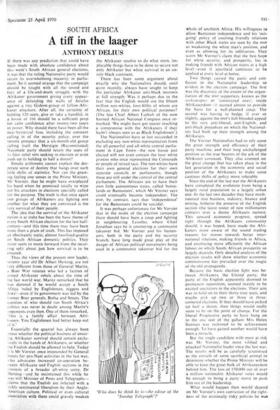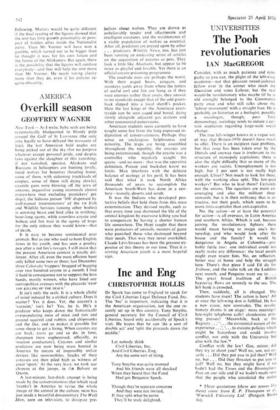SOUTH AFRICA
A tiff in the laager
ANTHONY DELIUS
If there was any prediction that could have been made with absolute confidence about this week's South African general elections, it was that the ruling Nationalist party would retain its overwhelming majority in parlia- ment. So it seemed strange that the campaign should be fought with all the sound and fury of a life-and-death struggle, with the Afrikaner government giving every appear- ance of defending the walls of Jericho against a tiny Gideon-group of fellow-Afri- kaner attackers. After all, the certainty of holding 120 seats, give or take a handful, in a house of 166 should be a sufficient prop for calm confidence after twenty-two years in power. Why should there have been all the near-hysterical fuss, including the constant calling in of the security police, over the remote prospect that a six-month-old group calling itself the Herstigte (Reconstituted) Nasionale party should retain the seats of its four rebel MPS seeking re-election or even push up its holding to half a dozen?
Simple arithmetic cannot explain the des- perate sense of destiny that hangs over such little shifts of statistics. Nor can the gnaw- ing feeling one senses in the Prime Minister, Mr Vorster, that he might have overplayed his hand when he promised totally to wipe out his attackers in elections specially called for the purpose. The truth is that once again two groups of Afrikaners are fighting one another for what they are convinced is the very survival of their people.
The idea that the survival of the Afrikaner nation is at stake has been the basic theme of every South-African election for the last half- century—and this time there may have been more than a grain of truth. This has imposed an obstinately static, almost fossilised quality on South African domestic politics. They never seem to move forward from the recur- ring split about just how survival is to be ensured.
Thus the views of the present HNP leader, seventy year old Dr Albert Hertzog, are not eery different from those of General Maritz, a Boer War veteran who led a faction of armed Afrikaner rebels about the time of the last world war. Maritz remarked that he was damned if he would accept a South Africa 'ruled by Englishmen, niggers and Jews'—even if its government was led by the former Boer generals, Botha and Smuts. The question of who should run South Africa's politics was never in doubt among Maritz's opponents even then. One of them remarked, 'his is a family affair between Afri- kaners. You Englishmen had better keep out of it?
Essentially the quarrel has always been about whether the political business of ensur- ing Afrikaner survival should remain exclu- sively in the hands of Afrikaners. or whether the English should be allowed to help. Today it is Mr Vorster, once impounded by General Smuts for pro-Nazi activities in the last war, who advocates increased co-operation be- tween Afrikaans and English sections in the Interests of a broader all-white unity. Dr Hertzog—and he maintained this while he was still Minister of Posts and Telegraphs— claims that the English are infected with a sickly sentimental liberalism by their Anglo- American culture. Political or even cultural association with them could gravely weaken
the Afrikaner resolve to do what stern, placable things have to be done to secure not only Afrikaner but white survival in an un- ruly black continent.
There has been some argument about exactly why the Nationalists should, until quite recently, always have sought to keep the particular Afrikaner anti-black neurosis at full strength. Was it perhaps due to the fear that the English would use the fifteen million non-whites, four-fifths of whom are African, for their own political purposes? (The late Chief Albert Luthuli of the now banned African National Congress once re- marked, 'We might have got nearer reaching a compromise with the Afrikaners if they hadn't always seen us as Black Englishmen'.)
The Nationalists have at last succeeded in excluding any non-white representation from the all-powerful and all-white central parlia- ment in Cape Town—the new house just elected will not even contain the four white proxies who once represented the Coloureds or people of mixed race. The non-whites have their own general elections for their own separate councils or parliaments, though these are still under the control of the central parliament. The Africans are to have their own little autonomous states, called 'home- lands or Bantustans', which Mr Vorster says could eventually become independent. The HNP, by contrast, says that 'independence' for the Bantustans could be suicidal.
It was perhaps unfortunate for Mr Vorster that in the midst of the election campaign there should have been a coup and fighting in neighbouring Lesotho, where Chief Jonathan says he is countering a communist takeover bid. Mr Vorster and his lieuten- ants, both in the party and the security branch, have long made great play of the danger of African political movements being used in a communist takeover bid for the 'Who does he think he is—the editor of the "Sunday Telegraph"?'
whole of southern Africa. His willingness to allow Bantustan independence and his 'out,
going' policy of courting friendly relations with other Black states are seen by the HNP as weakening the white man's position, and even as allowing for its infiltration. They scorn Mr Vorster's claim that the best hope for white security, and prosperity, lies in
making friends with African states at a high level—even if apartheid continues to be applied at every level at home.
Two things caused the panic and con• fusion in the Nationalist leadership so evident in the election campaign. The first was the discovery of the extent of the organ-
isation of the HNP supporters, known as the verkrampte.s. or 'constricted ones', inside Afrikanerdom—it seemed almost to provide the basis for a well-planned coup. The second was having to hedge, if ever so slightly, against the HNP'S full-blooded appeal to the very anti-liberal, anti-English, and anti-black prejudices on which the National- ists had built up their strength among the Afrikaners.
The Vorster Nationalists had to rely upon the great strength and efficiency of their party machine, and their long unchallenged position as the true bearers of the ark of the Afrikaner covenant. They also counted on the great change that has taken place in the last generation in the economic and social position of the Afrikaners to make some cautious shifts of policy more tolerable.
Since the end of the last war the Afrikaners have completed the evolution from being a largely rural population to a largely urban one. In the last two decades they have mush- roomed into business, industry, finance and mining, hitherto the preserve of the English section (the latest roster of new millionaires contains over a dozen Afrikaans names). This upward economic progress, spread right through the Afrikaans community should, it was hoped, have made the Afri-
kaners more aware of the sound trading reasons for moves towards better inter- national relations, making friends in Africa, and employing more efficiently the African labour on which South African prosperity so largely depends. Only detailed analysis of the election results will show whether economic commonsense has prevailed over the magic of the old propaganda.
Because the basic election fight was be- tween Afrikaners, the United party, the party of the English apparently doomed to permanent opposition, seemed mainly to be excited spectators in the elections. Their aim was to hold on to their thirty-nine seats, and maybe pick up two or three in three- cornered elections. If they should have picked up half a dozen, then things would really
seem to he on the point of change. For the liberal Progressive party to have hung on to the one seat of the gallant Mrs Helen Suzman was reckoned to be achievement enough. To have gained another would have been a miracle.
But the single candidate with most at risk was Mr Vorster, the most vilified and attacked Nationalist leader since the last war.
The results will be as carefully scrutinised as the entrails of some sacrificial animal to
determine whether the Prime Minister will be able to keep the great bulk of Afrikanerdom behind him. The loss of 150,000 out of over
a million nationalist Afrikaner votes would be enough to bring a party move to push him out of the leadership.
What would happen then would depend on Mr Vorster's own conviction of the right- ness of the minimally risky policies he was following. Matters would be quite different if the final reading of the figures showed that the imp has little growth potentiality or pros- pect of hidden allies inside the Nationalist party. Then Mr Vorster will have won a gamble, which turned out to be bigger than he thought it was, for his own future and the future of the Afrikaners. But again, there is the possibility that the figures will confuse everybody—and that will help the HNP more than Mr Vorster. He needs voting clarity more than they do, even if his policies re- quire obscurity.







































 Previous page
Previous page